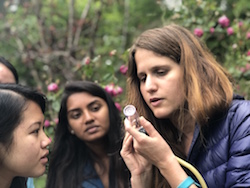Congratulations to IB's Class of 2020!
Submitted by mjalbe on Wed, 05/27/2020 - 08:48We are so proud of each and every one of you and wish we could celebrate your remarkable achievements in person.
We are so proud of each and every one of you and wish we could celebrate your remarkable achievements in person.
The IB Insight Spring 2020 newsletter is here! Join us in celebrating the extraordinary accomplishments of IB's women in this edition honoring the 150 year anniversary of women being admitted to Cal.
Biologists from the University of California, Berkeley, and Nanjing University of Aeronautics and Astronautics observed geckos running horizontally along walls to learn how they use their five toes to compensate for different types of surfaces without slowing down.
“The research helped answer a fundamental question: Why have many toes?” said Robert Full, UC Berkeley professor of integrative biology.
A new study by University of California, Berkeley, microbial ecologists used experimental evolution to help identify the core microbiome of commercial tomatoes. They selected for those microbial taxa that best survived on the plants and then showed that these “domesticated” microbial communities are able to effectively fend off random microbes that land on the plants. In other words, these selected communities look like a stable, healthy plant microbiome, akin to what a robust tomato plant might pass to its offspring.
In a publication appearing today in the journal Science Translational Medicine, University of California, Berkeley, and Ben-Gurion University scientists report that senile mice given one such drug had fewer signs of brain inflammation and were better able to learn new tasks, becoming almost as adept as mice half their age.
The IB Insight Fall 2019 newsletter is here! Learn all about what’s new in IB, our new faculty, and what our IB alumni are up to here.
Monarch butterflies eat only milkweed, a poisonous plant that should kill them. The butterflies thrive on it, even storing milkweed toxins in their bodies as a defense against hungry birds. For decades, scientists have marveled at this adaptation. On Thursday, a team of researchers announced they had pinpointed the key evolutionary steps that led to it...
For many people, including women, the answer is yes, which spurred dozens of paleontologists around the world – all of them women – to glue on beards for photos now being exhibited at the Lawrence Hall of Science (LHS) at the University of California, Berkeley. The ironic message of the Bearded Lady Project is that, contrary to the persisting stereotype, you don’t have to be a man to love fieldwork and contribute to science; in fact: many field scientists are not.
 With recent advancements in portable, reliable, and low-cost scientific instruments, biological field research is flourishing. Now, a group of UC Berkeley undergraduates is newly equipped to investigate the natural world in real time with these new tools at their disposal.
With recent advancements in portable, reliable, and low-cost scientific instruments, biological field research is flourishing. Now, a group of UC Berkeley undergraduates is newly equipped to investigate the natural world in real time with these new tools at their disposal.
From May 20-28, 2019, the Department of Integrative Biology’s inaugural Field Genomics summer course immersed first-year undergraduates in cutting-edge molecular biology techniques. The course provided thorough hands-on training in skills such as sample collection, nucleotide isolation, and portable nanopore DNA sequencing.
“It’s always dinosaur bones,” says Pat Holroyd, feigning exasperation. She handles Vertebrate Collections for the UC Museum of Paleontology. Leslea Hlusko, a professor in the department of integrative biology, interjects: “But it’s actually better ... dire wolves!”